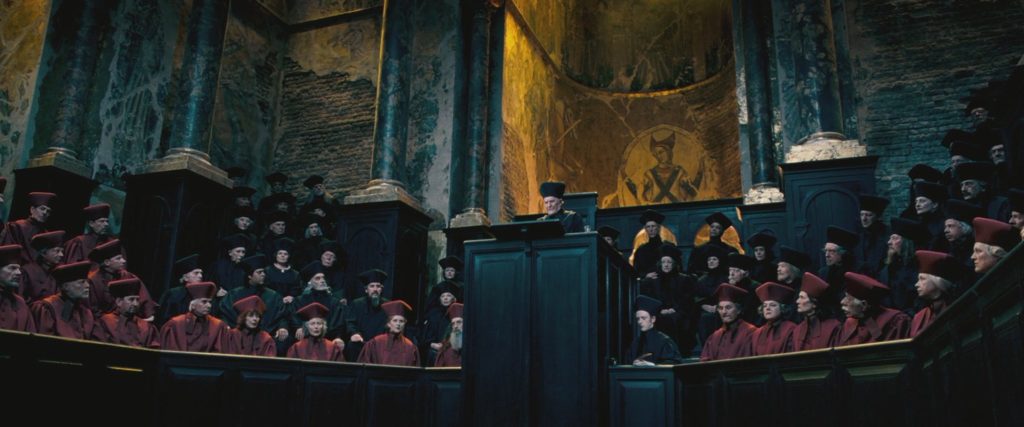The Ugly Truth Regarding Veritaserum
The absence of Veritaserum as an evidentiary tool in the criminal justice system of the wizarding community in the UK is, on the surface, peculiar. According to Snape, the use of Veritaserum “is controlled by very strict Ministry guidelines” (GoF 27), which raises the question of why he had such an abundance of it in his storeroom. From the way that Veritaserum is described, an orally administered serum that would have one spilling out one’s most inner secrets, one wonders why the Ministry of Magic doesn’t use it more in the criminal trials of Dark wizards.
J.K. Rowling suggested, on her old website, that Veritaserum was not commonly used in criminal trials because it “works best upon the unsuspecting, the vulnerable and those insufficiently skilled,” such as the incapacitated Barty Crouch, Jr. at the end of Goblet of Fire. However, the constantly vigilant Alastor Moody was prepared to use it to determine whether a Death Eater was impersonating Harry in Order of the Phoenix. Although prodigious wizards, such as Slughorn, could have defended themselves against the effects of the potion, I think that the Ministry would be able to adequately incapacitate suspects in criminal trials to prevent this. I do not think that most wizards stripped of their wands, tied down in chains in the center of the Wizengamot, and surrounded by Dementors would have the capacity to protect their minds against Veritaserum.
Veritaserum has been shown in the Harry Potter books to produce false positives, as in the case of Morfin Gaunt, whose memory had been modified by Tom Riddle, Jr. Memories are not so explicitly modifiable in the Muggle world, but they are unreliable and malleable. We are not computational beings that encode, store, and retrieve memories. Our memories are emotionally influenced, and confidence is no indication that what we believe to be true is actually true. Morfin confidently confessed and bragged about murdering the Riddles even though this was untrue. In our world, innocent people internalizing guilt for crimes that they did not commit is not unheard of. A recent article in the New Yorker titled “Remembering the Murder You Didn’t Commit” described two people who had “vivid memories of committing” a crime even though they were exonerated. The complexity of human memory is so mysterious to even wizards that the Ministry of Magic has a room dedicated to the study of brains in the Department of Mysteries.
The Ministry’s lack of use of Veritaserum in criminal trials might be an indication that they are aware of the limitations and unreliability of the potion. Rowling uses Veritaserum in Harry Potter to draw parallels to pharmaceutical truth serums and polygraphs in our world. Polygraphs are as unreliable in criminal trials in the Muggle world as Veritaserum is in the wizarding world. An article from Vox titled “Lie detectors: Why they don’t work, and why police use them anyway” states that studies have shown that polygraphs “incorrectly indicate that lots of honest people are lying.” I think that over time the Ministry has become more aware that Veritaserum is unreliable, and that is why its use is so scarce during Harry’s lifetime. The most prominent examples demonstrating the unreliability of Veritaserum in the Harry Potter books are historical rather than recent. The convictions of Morfin Gaunt and Hokey the house-elf occurred long before Harry was born.
Based on what has been discussed in this article, where do we draw the line regarding the ethical use of Veritaserum and other techniques of invading people’s memories, such as Legilimency? Do criminal suspects forfeit their right to privacy? Does the Ministry have a right to invade people’s privacy for the “greater good”? Similarly, in the Muggle world, do governments have the right to violate the privacy of citizens in the interests of national security? In Prisoner of Azkaban, Harry says, “For… for some things…” (PoA 12) when Lupin asks him if he thinks “anyone deserves” a kiss from a Dementor. Is Harry’s conviction applicable to the invasion of people’s minds, memories, and by extension privacy?




